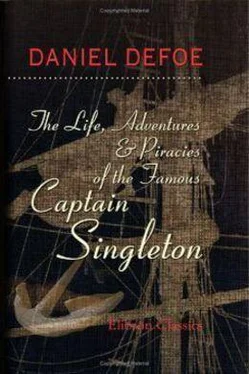But my head lay another way. I had been in the East Indies, and had entertained a notion ever since that, if we went thither, we could not fail of making good work of it, and that we might have a safe retreat, and good beef to victual our ship, among my old friends the natives of Zanzibar, on the coast of Mozambique, or the island of St Lawrence. I say, my thoughts lay this way; and I read so many lectures to them all of the advantages they would certainly make of their strength by the prizes they would take in the Gulf of Mocha, or the Red Sea, and on the coast of Malabar, or the Bay of Bengal, that I amazed them.
With these arguments I prevailed on them, and we all resolved to steer away S.E. for the Cape of Good Hope; and, in consequence of this resolution, we concluded to keep the sloop, and sail with all three, not doubting, as I assured them, but we should find men there to make up the number wanting, and if not, we might cast any of them off when we pleased.
We could do no less than make our friend William captain of the sloop which, with such good management, he had brought us. He told us, though with much good manners, he would not command her as a frigate; but, if we would give her to him for his share of the Guinea ship, which we came very honestly by, he would keep us company as a victualler, if we commanded him, as long as he was under the same force that took him away.
We understood him, so gave him the sloop, but upon condition that he should not go from us, and should be entirely under our command. However, William was not so easy as before; and, indeed, as we afterwards wanted the sloop to cruise for purchase, and a right thorough–paced pirate in her, so I was in such pain for William that I could not be without him, for he was my privy counsellor and companion upon all occasions; so I put a Scotsman, a bold, enterprising, gallant fellow, into her, named Gordon, and made her carry twelve guns and four petereroes, though, indeed, we wanted men, for we were none of us manned in proportion to our force.
We sailed away for the Cape of Good Hope the beginning of October 1706, and passed by, in sight of the Cape, the 12th of November following, having met with a great deal of bad weather. We saw several merchant–ships in the roads there, as well English as Dutch, whether outward bound or homeward we could not tell; be it what it would, we did not think fit to come to an anchor, not knowing what they might be, or what they might attempt against us, when they knew what we were. However, as we wanted fresh water, we sent the two boats belonging to the Portuguese man–of–war, with all Portuguese seamen or negroes in them, to the watering–place, to take in water; and in the meantime we hung out a Portuguese ancient at sea, and lay by all that night. They knew not what we were, but it seems we passed for anything but really what we was.
Our boats returning the third time loaden, about five o'clock next morning, we thought ourselves sufficiently watered, and stood away to the eastward; but, before our men returned the last time, the wind blowing an easy gale at west, we perceived a boat in the grey of the morning under sail, crowding to come up with us, as if they were afraid we should be gone. We soon found it was an English long–boat, and that it was pretty full of men. We could not imagine what the meaning of it should be; but, as it was but a boat, we thought there could be no great harm in it to let them come on board; and if it appeared they came only to inquire who we were, we would give them a full account of our business, by taking them along with us, seeing we wanted men as much as anything. But they saved us the labour of being in doubt how to dispose of them; for it seems our Portuguese seamen, who went for water, had not been so silent at the watering–places as we thought they would have been. But the case, in short, was this: Captain ― (I forbear his name at present, for a particular reason), captain of an East India merchant–ship, bound afterwards for China, had found some reason to be very severe with his men, and had handled some of them very roughly at St Helena; insomuch, that they threatened among themselves to leave the ship the first opportunity, and had long wished for that opportunity. Some of these men, it seems, had met with our boat at the watering–place, and inquiring of one another who we were, and upon what account, whether the Portuguese seamen, by faltering in their account, made them suspect that we were out upon the cruise, or whether they told it in plain English or no (for they all spoke English enough to be understood), but so it was, that as soon as ever the men carried the news on board, that the ships which lay by to the eastward were English, and that they were going upon the account , which, by they way, was a sea term for a pirate; I say, as soon as ever they heard it, they went to work, and getting all things ready in the night, their chests and clothes, and whatever else they could, they came away before it was day, and came up with us about seven o'clock.
When they came by the ship's side which I commanded we hailed them in the usual manner, to know what and who they were, and what their business. They answered they were Englishmen, and desired to come on board. We told them they might lay the ship on board, but ordered they should let only one man enter the ship till the captain knew their business, and that he should come without any arms. They said, Ay, with all their hearts.
We presently found their business, and that they desired to go with us; and as for their arms, they desired we would send men on board the boat, and that they would deliver them all to us, which was done. The fellow that came up to me told me how they had been used by their captain, how he had starved the men, and used them like dogs, and that, if the rest of the men knew they should be admitted, he was satisfied two–thirds of them would leave the ship. We found the fellows were very hearty in their resolution, and jolly brisk sailors they were; so I told them I would do nothing without our admiral, that was the captain of the other ship; so I sent my pinnace on board Captain Wilmot, to desire him to come on board. But he was indisposed, and being to leeward, excused his coming, but left it all to me; but before my boat was returned, Captain Wilmot called to me by his speaking–trumpet, which all the men might hear as well as I; thus, calling me by my name, "I hear they are honest fellows; pray tell them they are all welcome, and make them a bowl of punch."
As the men heard it as well as I, there was no need to tell them what the captain said; and, as soon as the trumpet had done, they set up a huzza, that showed us they were very hearty in their coming to us; but we bound them to us by a stronger obligation still after this, for when we came to Madagascar, Captain Wilmot, with consent of all the ship's company, ordered that these men should have as much money given them out of the stock as was due to them for their pay in the ship they had left; and after that we allowed them twenty pieces of eight a man bounty money; and thus we entered them upon shares, as we were all, and brave stout fellows they were, being eighteen in number, whereof two were midshipmen, and one a carpenter.
It was the 28th of November, when, having had some bad weather, we came to an anchor in the road off St Augustine Bay, at the south–west end of my old acquaintance the isle of Madagascar. We lay here awhile and trafficked with the natives for some good beef; though the weather was so hot that we could not promise ourselves to salt any of it up to keep; but I showed them the way which we practised before, to salt it first with saltpetre, then cure it by drying it in the sun, which made it eat very agreeably, though not so wholesome for our men, that not agreeing with our way of cooking, viz., boiling with pudding, brewis, etc., and particularly this way, would be too salt, and the fat of the meat be rusty, or dried away so as not to be eaten.
Читать дальше












